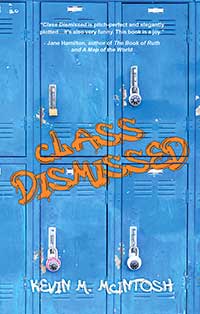 *
*
Kevin McIntosh met me at the outdoor patio of the Neighborhood Restaurant in Union Square to chat about his new book, Class Dismissed, as well as his life as a writer and teacher.

Originally from Illinois, McIntosh counts Ernest Hemingway as one of his earliest influences. After all he grew up in Oak Park, Illinois, where the great man spent his early years.
McIntosh has a wide range of experience as a teacher. He has taught in inner city schools, and at high-toned suburban academies.
McIntosh, as a young man, had a bit of the wanderlust, as he taught in Oakland, New York City, and in Dover Massachusetts, and held a variety of jobs before that. I asked him about his Somerville experience. He told me, “My wife and I had lived in Newton, Massachusetts for twenty years. We wanted to downsize and be close to the city. We have been here for six years and we love it.”
McIntosh noted that some of his favorite spots in our burg are the Common Grounds Coffee Shop in Ball Square (where he likes to write) and the Burren, an Irish pub in the heart of Davis Square.
McIntosh, a man in his late 50s, who sports a professorial beard, and a casual manner, has written a novel, Class Dismissed, that is very loosely based on his own experiences as a young teacher.
The 30-year-old protagonist of the novel, Patrick Lynch is from the hinterlands of Minnesota, and is adjusting to the mean streets and schools of New York City. Due to an unfortunate classroom incident with a student, he finds himself in the notorious “Rubber Room.”
The New York school system’s Rubber Room, which was exposed by the media in the early 2000s, (and may still be in use) is a sort of Twilight Zone/limbo space. Here, teachers who are held for various infractions wait for judgment from above about their exoneration – or not. They are in essence paid to sit. This can go on for years.
McIntosh’s protagonist sits in this room, while his relationship with his girlfriend goes South, not to mention, that his life in general takes a downward spiral. McIntosh, who has never experienced such a fate, said that the room was, “Like a scene from Waiting for Godot, with this monstrous bureaucracy rattling on, keeping the teachers in suspended animation.” Throughout the book McIntosh brings in the intricate aspects of the classroom experience, the students, the teachers, and the institution.
McIntosh explained to me that in his career teaching English he found the inner-city kids just as creative as the kids he taught in the toney suburbs. He explained, “The kids in the suburbs were more grade conscious, bright kids, but narrowly focused. In New York City the kids were more open and seemed to be more spontaneous. There was a genuine joy for learning.”
McIntosh, like may Somerville creatives I have interviewed, has an eclectic background. He was an aspiring playwright in his younger years. His play, a musical, By George, about the Gershwin brothers, was produced at his Alma mater, Carleton College, and had a staged reading at the Playwright’s Center in Minneapolis. In this time at the center, he often saw the great African American playwright August Wilson walk the halls.
It is always a pleasure to interview people at the Neighborhood Restaurant patio, with its tangle of vines, comfort food, and friendly vibe. And I was glad to connect with McIntosh here, in the Paris of New England.
McIntosh will be reading June 30 at the Harvard Bookstore. For more details go to: https://kevinmmcintosh.com.















Reader Comments